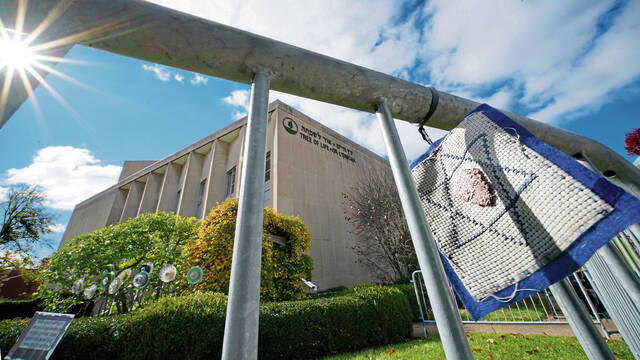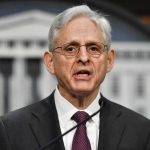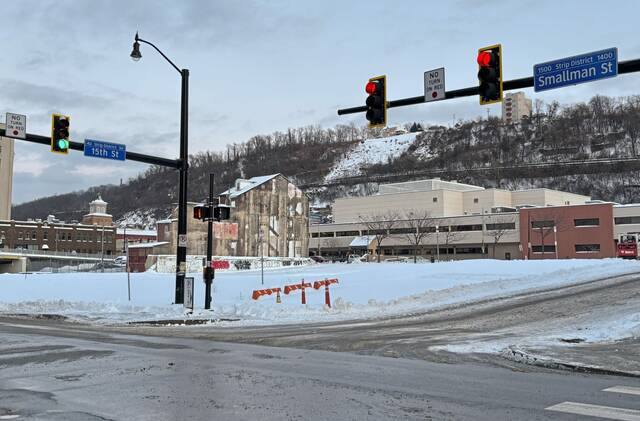Defense attorneys for the man accused of killing 11 people at a Squirrel Hill synagogue said Tuesday that the U.S. Department of Justice is arbitrarily seeking the death penalty against their client but failed to do the same in other attempted mass shooting cases in which Jewish and Latino people were targeted.
Attorneys for Robert Bowers are again asking the federal judge presiding over his case to forbid the government from seeking capital punishment.
The request comes just 20 days before jury selection is scheduled to start.
Bowers, 50, of Baldwin, is accused of killing 11 people at the Tree of Life synagogue building on Wilkins Avenue on Oct. 27, 2018.
Three congregations worshipped there, including Tree of Life-Or L’Simcha, Dor Hadash and New Light.
In its filing, the defense noted that under the current administration, the Justice Department has withdrawn its notice to seek the death penalty in 23 cases, and has chosen not to seek capital punishment against 389 defendants potentially eligible for it.
“Here, the arbitrary nature of the federal death penalty is confirmed by the lack of a discernible, principled basis for why the Department of Justice continues to pursue death sentences for Mr. Bowers but not in very recent comparable cases,” the defense wrote.
In their 11-page motion, attorneys representing Bowers said that the government’s stance becomes “even more arbitrary and capricious” where the decision is made by a committee of Justice Department staff and not U.S. Attorney General Merrick Garland “who has expressed his own reservations about the death penalty and has reversed multiple death penalty related decisions made by the prior administration.”
In July 2021, Garland announced a moratorium on federal executions while the Justice Department reviews its policies and procedures. No timetable was given on such a review.
The defense noted that the government said it would not seek death in the mass shooting at an El Paso, Texas, Walmart in which 23 people were killed by a white man, who said he was “defending [his] country” from “the Hispanic invasion of Texas.”
The initial intent to see death against Bowers was authorized by former Attorney General Bill Barr under the Trump administration. At the time, the defense filing said, the authorization ran counter to the “expressed views” of two of the three congregations who were targeted in the synagogue attack.
According to the filing, last July, Bowers’ attorneys submitted a 26-page letter to the U.S. attorney’s office detailing significant events in his life history, as well as the results of psychiatric and neurological evaluations. The defense has said that Bowers was diagnosed with schizophrenia and epilepsy.
The letter asked the Justice Department to withdraw its notice of intent to seek the death penalty. It offered to allow Bowers to plead guilty to all counts in exchange for multiple life sentences with no chance for release, as well as a waiver of any appeals.
“All the information submitted to the United States Attorney establishes that Mr. Bowers is a person with a major mental illness, schizophrenia (identified based on clinical interviews, life history, testing and imaging), and structural and functional brain impairments (identified on the MRI, PET, EEG, and neuropsychological testing),” the defense wrote.
Then, in February, the filing continues, the defense submitted 461 “life history documents” to bolster their argument.
During its review, the government sought an interview and psychiatric evaluation of Bowers, but the defense objected without protections being provided to their client.
Then, in an email dated March 16 and attached to the defense filing, Richard E. Burns, the chief of the Justice Department’s capital case section, wrote that “the only additional information that would be helpful to a determination would be the opportunity to interview your client. We understand you have declined to make your client available for such an interview.
“We therefore have the information necessary to make a decision,” Burns concluded.
On March 21, the defense received an official letter from the government announcing that the request to withdraw the death penalty was denied.
The letter was not signed by the attorney general, the defense said, and there was no indication he was directly involved in the decision.
“[I]t appears that the request to withdraw the death notice was denied by a committee of unnamed, rotating Department of Justice staff and field prosecutors, and not by Attorney General Merrick Garland,” the defense wrote.
That, they continued, is in contrast to Garland “having taken personal responsibility” in pursing the only capital trial of the current administration against a man charged in New York with ties to ISIS.
But in the same email from Burns, he wrote that the department’s process for reviewing capital cases is “not opaque” and is detailed in the Justice Manual, which is available to the public.
The defense asked U.S. District Judge Robert Colville to throw out the potential for the death penalty in the case, or in the alternative, require discovery to explain the reasons why the Justice Department withdrew its death notices in the other cases and chose not to seek death in the hundreds of others that were eligible.











